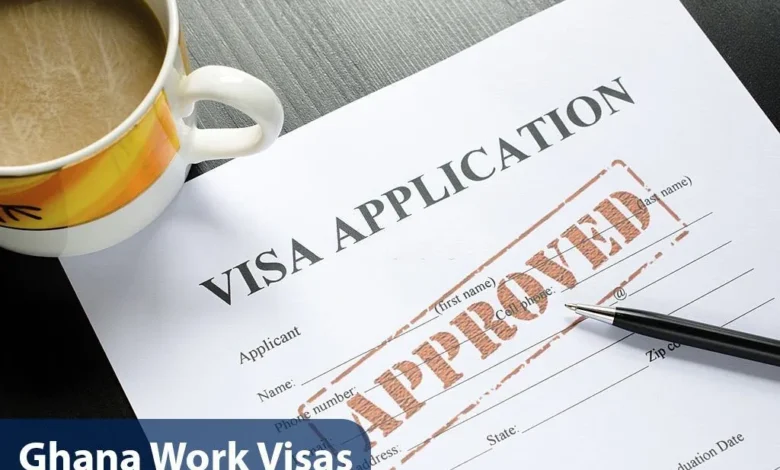Step-by-Step Guide to Getting a U.S. Work Visa from Ghana or Nigeria

For many Ghanaians and Nigerians, working in the United States offers a life-changing opportunity — a chance to earn a higher income, gain international work experience, and support family back home. However, getting a U.S. work visa is a formal legal process that requires careful planning and awareness.
In this guide, we’ll walk you through the step-by-step process to legally apply for a U.S. work visa from Ghana or Nigeria in 2025, including visa types, documents needed, costs, and useful tips to avoid common mistakes.
1. Understand the Types of U.S. Work Visas Available
Before applying, you need to know which visa suits your skills and job offer. The most common work visas for entry-level and skilled foreign workers include:
H-2A Visa (Seasonal Agricultural Workers)
For people hired to work on farms (fruit pickers, livestock workers, crop harvesters). Jobs last 3–10 months.
H-2B Visa (Seasonal Non-Agricultural Workers)
For hotel staff, cleaners, landscapers, construction laborers, factory workers, etc. Popular for hospitality and general labor.
H-1B Visa (Skilled Workers & Professionals)
For individuals with a university degree in IT, engineering, healthcare, etc. Requires sponsorship from a U.S. employer.
J-1 Visa (Internship & Cultural Exchange)
For temporary work-based training or internships. Includes au pair and summer work travel.
EB-3 Visa (Permanent Work-Based Immigration)
For skilled and unskilled workers who are sponsored by a U.S. employer for permanent residence (green card).
2. Find a U.S. Employer Willing to Sponsor You
The U.S. work visa process starts with the employer, not the applicant.
How to Find a Sponsor:
-
Use trusted websites like:
-
SeasonalJobs.dol.gov – for H-2A and H-2B jobs
-
Myvisajobs.com – filter jobs by visa sponsorship
-
Indeed.com and Glassdoor – search for “H-2B sponsorship” jobs
-
-
Connect with U.S. recruitment agencies that are licensed
-
Apply early — demand is high, and spots fill quickly
Warning:
Avoid fake “agents” promising guaranteed U.S. jobs for large fees. Only accept offers with official job contracts and proof of employer registration.
3. Employer Files a Petition on Your Behalf
Once an employer hires you, they must submit a petition to the U.S. Citizenship and Immigration Services (USCIS).
For H-2A/H-2B visas:
-
Employer submits Form I-129 (Petition for Nonimmigrant Worker)
-
They must prove they couldn’t find U.S. workers for the job
-
After approval, you receive a case number to continue the visa process
For H-1B or EB-3:
-
The employer also needs to submit a Labor Certification with the U.S. Department of Labor
-
More complex and may take longer to process
4. Wait for Approval (Notice of Approval or I-797 Form)
After USCIS approves your employer’s petition, they’ll receive a Form I-797 (Notice of Action). You’ll need this document to schedule your visa interview.
5. Complete the DS-160 Visa Application Online
Now it’s your turn to start the visa application.
Visit: https://ceac.state.gov/
Fill out Form DS-160, the official U.S. visa application form.
You’ll need:
-
Passport details
-
Employer’s name and petition number (from I-797)
-
Your home address, education, and job history
-
Digital passport-size photo (recent and clear)
Save the DS-160 confirmation page and print it. You’ll need it for the interview.
6. Pay the Visa Application Fee
As of 2025, the application fee for most U.S. work visas is:
-
$190 USD (approx. ₦280,000 or GH₵2,800)
-
Paid online or at designated banks (U.S. embassy will guide you)
7. Schedule Your Visa Interview at the U.S. Embassy
Once you’ve paid the visa fee, book an appointment at your local U.S. embassy or consulate:
-
In Ghana: U.S. Embassy in Accra – gh.usembassy.gov
-
In Nigeria: U.S. Embassy in Abuja or Consulate in Lagos – ng.usembassy.gov
What to bring to the interview:
-
Valid passport (with at least 6 months validity)
-
DS-160 confirmation page
-
Appointment letter
-
Visa fee receipt
-
Form I-797 (approval notice)
-
Job contract or offer letter
-
Proof of accommodation or return plans
-
Any certificates or training documents (if required)
8. Attend the Interview and Answer Honestly
The interview is short (5–10 minutes). You may be asked:
-
Why are you traveling to the U.S.?
-
Who is your employer?
-
What type of job will you do?
-
How long will you stay?
-
Do you plan to return home after the contract?
Tip: Answer clearly and confidently. Bring original documents and stay calm.
9. Wait for Your Visa Decision
If approved, the embassy will keep your passport for stamping and return it in about 7–10 working days. If denied, they’ll explain why (sometimes due to incomplete documents or doubts about your return).
10. Travel to the U.S. and Start Working
Once you get your visa, book your flight and get ready. Upon arrival in the U.S., Customs and Border Protection (CBP) officers may ask to see your:
-
Visa and passport
-
Job offer letter
-
Proof of accommodation
-
Return ticket (if applicable)
You’ll then receive an I-94 form, confirming your legal entry and how long you can stay.
Important Warnings and Tips
-
Never overstay your visa. It could ruin future chances of visiting the U.S.
-
Avoid middlemen who charge huge fees or promise fake job offers
-
Keep in touch with your employer and follow U.S. laws strictly
-
Consider learning basic English and job-related vocabulary
Getting a U.S. work visa from Ghana or Nigeria is possible — but it takes planning, patience, and honesty. The easiest path for most applicants is through the H-2A or H-2B programs, which offer temporary jobs in agriculture, hospitality, and manual labor. Skilled workers can apply for H-1B or EB-3 visas with the right qualifications and employer sponsorship.
Start early, stay informed, and use only official channels. With determination and preparation, you could soon be on your way to a better future in the United States.
Source: Thepressradio.com





